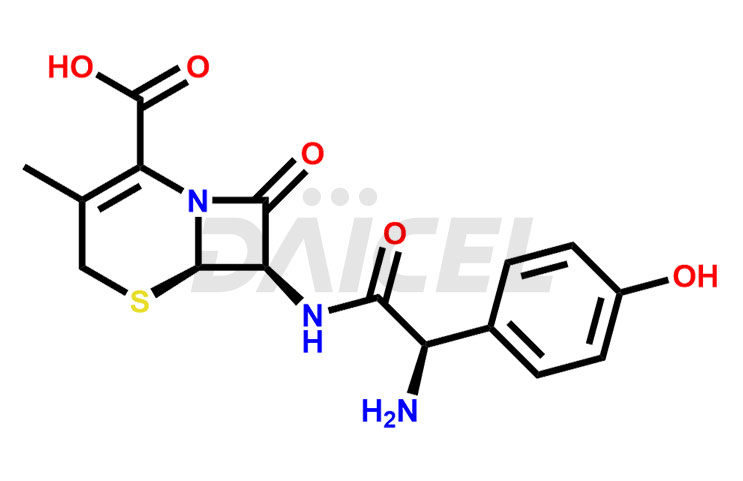LOAD MORE
You're viewed 9 of 11 products
Daicel Pharma synthesizes more than ten high-quality Cefadroxil impurities, such as Cefadroxil Dimer, Cefadroxil impurity-H, Cefadroxil EP impurity A, Cefadroxil related compound D, Ethyl Cefadroxil homolog, Methoxy cefadroxil, N-Phenylglycyl cefadroxil, Diketopiperazine derivative, 7-Ethoxycarbonyl 7-ADCA, and more, which help in determining the quality, stability, and biological safety of the active pharmaceutical ingredient, Cefadroxil. Moreover, Daicel Pharma offers custom synthesis of Cefadroxil impurities and delivers them globally.
Cefadroxil [CAS: 50370-12-2] is an antibacterial drug belonging to the cephalosporin class.
Cefadroxil is a first-generation, semisynthetic cephalosporin antibiotic. It involves treating tonsillitis, pharyngitis, skin and skin structure infections, and urinary tract infections. It is effective against infections caused by various bacterial strains such as Staphylococcus, negative staphylococci, H. influenzae, E. coli, S. pneumoniae, P. mirabilis, Streptococcus pyogenes (group A beta-hemolytic streptococci), and Klebsiella sp. The drug is available under several trade names, including Duricef and Ultracef.

The chemical name of Cefadroxil is (6R,7R)-7-[[(2R)-2-Amino-2-(4-hydroxyphenyl)acetyl]amino]-3-methyl-8-oxo-5-thia-1-azabicyclo[4.2.0]oct-2-ene-2-carboxylic acid. Its chemical formula is C16H17N3O5S, and its molecular weight is approximately 363.4 g/mol.
Cefadroxil binds to some penicillin-binding proteins (PBPs) in the bacterial cell wall like other beta-lactam antibiotics. This action hinders the third and last phase of bacterial cell wall formation. Further, cell disintegration can occur by bacterial wall autolytic enzymes such as autolysins.
Some impurities found in Cefadroxil include degradation products, residual solvents, and metal ions. Degradation products form due to exposure to heat, moisture, and acidic or alkaline conditions. The residual solvents that exist after the manufacturing process cause impurity formation. Metal ions used during synthesis or storage cause impurities. The presence of these impurities affects the final drug’s quality, safety, and efficacy. Therefore, it is essential to reduce impurities during the synthesis and purification1 of Cefadroxil and thoroughly analyze and characterize the final product to ensure its safety and efficacy.
Daicel offers a Certificate of Analysis (CoA) from a cGMP-compliant analytical facility for more than ten Cefadroxil impurity standards, including Cefadroxil Dimer, Cefadroxil impurity-H, Cefadroxil EP impurity A, Cefadroxil related compound D, Ethyl Cefadroxil homolog, Methoxy cefadroxil, N-Phenylglycyl cefadroxil, Diketopiperazine derivative, 7-Ethoxycarbonyl 7-ADCA, and more. The CoA includes complete characterization data, such as 1H NMR, 13C NMR, IR, MASS, and HPLC purity2,3. We also provide 13C-DEPT and CHN on request. In addition, we give a complete characterization report on delivery. Daicel has the technology and expertise to prepare any unknown Cefadroxil impurity or degradation product. The company also provides labeled compounds to quantify the efficacy of generic Cefadroxil. Daicel offers highly pure isotope-labeled standards of Cefadroxil for bioanalytical research and BA/BE studies with isotopic purity data in the CoA.
The analytical methods used for the detection of impurities in Cefadroxil include high-performance liquid chromatography (HPLC), liquid chromatography mass spectrometry (LC-MS), etc.
Impurities in Cefadroxil can affect its safety by causing adverse effects in patients, such as allergic reactions, toxicity, and organ damage.
Impurities in Cefadroxil can affect the bioavailability of the drug by altering its pharmacokinetic properties, such as absorption, distribution, metabolism, and excretion.
The removal of Impurities in Cefadroxil may be by various purification techniques, such as recrystallization, column chromatography, and preparative HPLC.
Note: Products protected by valid patents by a manufacturer are not offered for sale in countries having patent protection. The sale of such products constitutes a patent infringement, and its liability is at the buyer's risk.